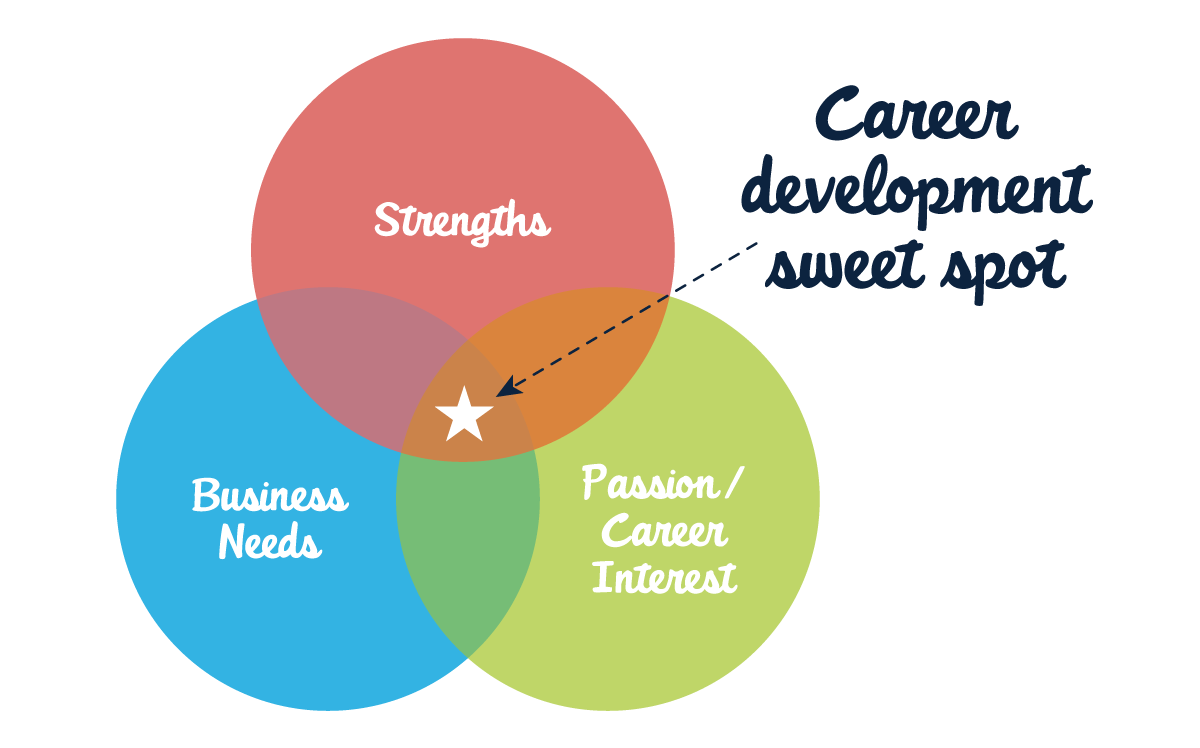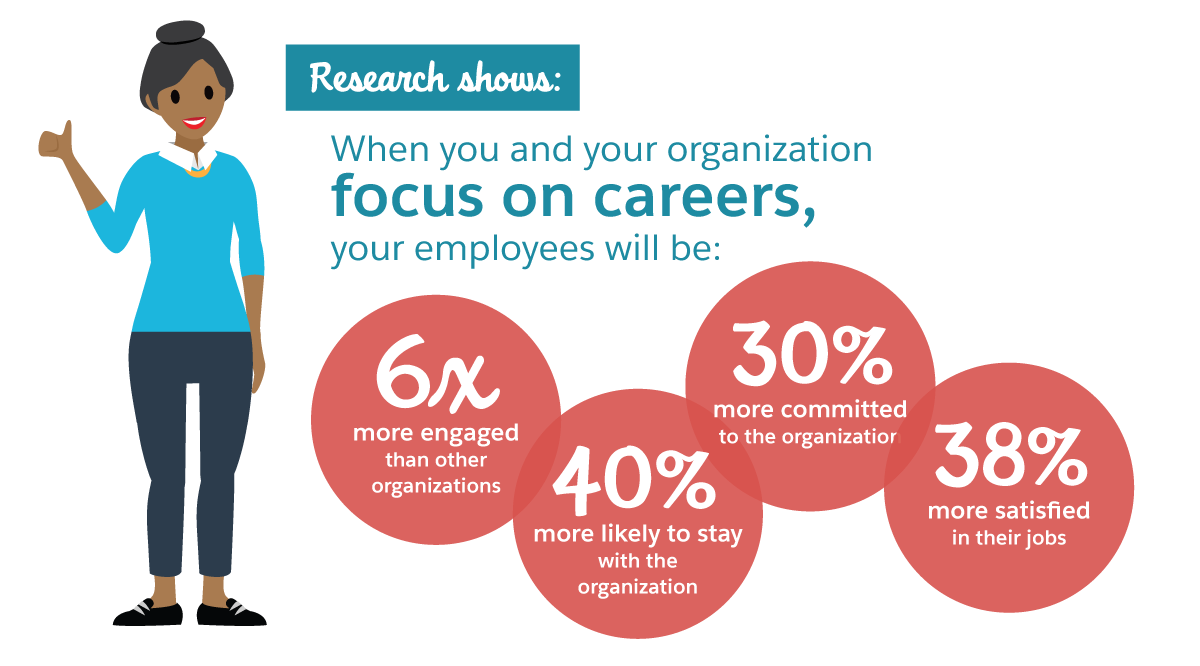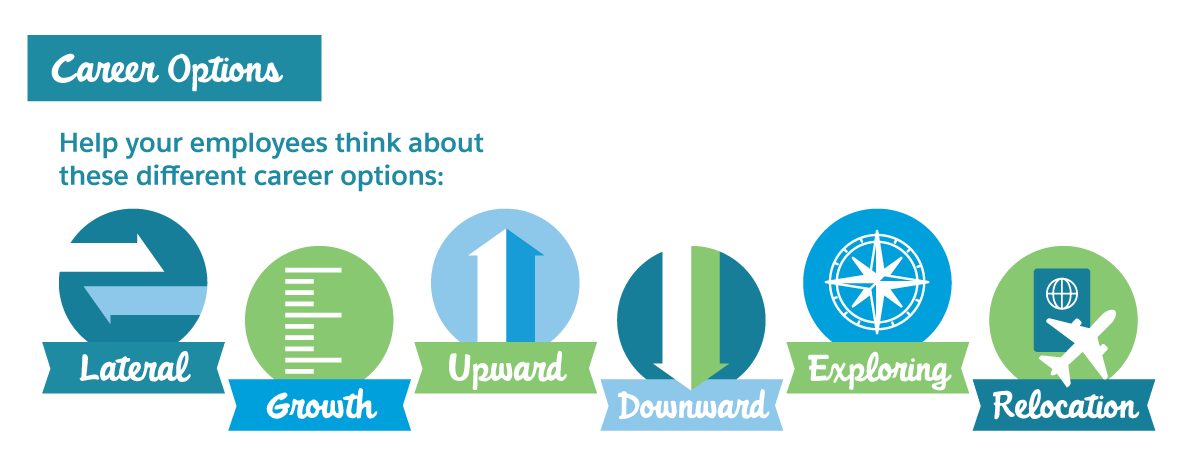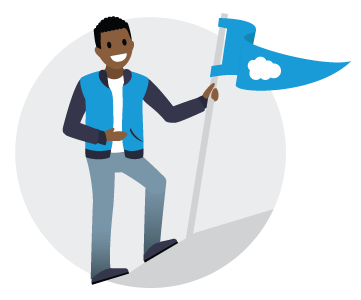Explore Career Development
Learning Objectives
After completing this unit, you’ll be able to:
- Enable your team members to take charge of their careers.
- Understand your role in career development.
- Help your employees explore multiple career options.
Exploring Career Development
What is career development?
Remember your first job? Your first promotion? What about that great job you took because it was different, exciting, and challenging? Wasn’t it a thrill to get to the point where you were ready to move into a new role or accomplish more than you ever imagined?
Well, your team members feel the same way. And they’re looking to you for guidance, inspiration, and support as they grow their careers.
Sure, some people wait for their careers to happen to them. But as their manager, you can help your team members own, plan, and work toward specific goals. It’s up to you to help them jump into their career journey themselves.
Remind your team of the wise words of Martin Luther King Jr, "You don’t have to see the whole staircase – just take the first step.”
Career development is helping employees do what they love to do. It’s helping them understand who they are, what they want from their career, and how to get there. It’s helping them find purpose, meaning, and focus for their work.
And don’t forget that the company benefits from employees who are clear about their careers. Career development is a balance between helping employees do what they love and ensuring that they are in roles and opportunities that help the company’s success. Your company benefits when you can place people in the right roles at the right time and retain great talent. Without great people, companies can’t achieve their goals.

You also benefit. When your employees feel that they can develop their careers, they’re more motivated and engaged and more likely to stay with the organization longer.
What does career development at Salesforce look like? Salesforce’s Global Business Operations (GBO) ran a Career Development Day for the 600 global finance, IT, marketing, corporate services, and legal employees. The day included fireside chats with senior leaders, an executive leadership panel, career resource booths, and breakout sessions on managing your career, leadership, emotional intelligence, and influencing through storytelling.
It was all supported by a GBO career mobile app built on the Salesforce platform and a dedicated GBO Career Day Chatter group to keep participants connected to all the great engagement during the day. Participants left with a development plan that they committed to working through with their managers on a quarterly basis.
Career development has evolved from what it used to be. So what’s changed? In the past, career development could just mean a promotion. Guess what? That’s not the case any more.
“But my employees are always looking for a promotion!” you say.
It can be a challenge to help employees realize that in today’s flatter organizations:
- Fewer promotional opportunities are available.
- Promotions are not given out as rewards for hard work, great work, or tenure.
Instead, promotions occur when there’s a match between a:
- Business need
- Job opening
- Employee’s readiness and capability to take on a new role or greater scope of responsibilities

Has your company moved to this new way of thinking? Not all have, and it can be risky. Employees are less committed, less productive, and less satisfied if they don’t have opportunities to grow their careers.

The bad news? This same study from the Corporate Executive Board found that on the flip side:
- Only 17% of employees say their managers are actively engaged in their career development.
- Two-thirds of managers don’t support their employees’ career development fully.
- When employees don’t feel good about their managers and career opportunities, they’re more likely to leave.
Yikes, that’s brutal!
If it’s so important, what stops managers from doing it? Does this sound familiar?
- “I just don’t have time!”
- “I don’t want to talk about promotions.”
- “We don’t have any career opportunities to offer anyway.”
- “It’s not my job—it’s all up to the employee.”
- “What do I say—I don’t know what’s next for them?”
It’s clear that supporting your employees in their careers really pays off. Yes, you’ll face some challenges along the way, but have no fear! We’re here to help.
So what’s your role?
Understanding Your Role
Ever feel like you are supposed to have all the answers when your employees ask you about their careers? Stressful? Yes! But guess what? You don’t need to have all the answers.
Your role is to listen, share feedback, and support them. Learn more from Beverly Kaye, a leadership expert and specialist in career development.
Career development is a partnership between you, your employees, and your company.
|
|
Employee | Manager | Company |
|---|---|---|---|
| Role |
|
|
|
| Value |
|
|
|
How well do you already coach your employees around their careers? Take the Career Coaching Self-Assessment to find out. You’ll find a sample in the Coaching & Feedback pack.
How did you do?
Do you help your employees:
- Understand the bigger picture of what they want and how to factor that into their career development?
- Take charge of their own careers?
- Learn about new opportunities within the organization?
- Evaluate multiple career options?
- Develop realistic career goals given their interests and the needs of the company?
- Network and find mentors?
- Find learning and development opportunities?
Think about what you want to do more of as you read on. We’ll give you lots of tips and ways to help your employees in their career development. Here we go!
Exploring Career Options
Remember our career jungle gym? There are lots of career options out there. As career expert Beverly Kaye says, “Up Is Not The Only Way”! It’s your role to help your team members think about these different options, not choose one for them.

Here’s more about the six common career options.
- Lateral—Move to another team and stay at the same level.
- Growth—Stay in the job and add new challenges and opportunities to learn.
- Upward—Take on a job at a higher level through a promotion.
- Downward—Take a lower level job in another part of the business to build new skills.
- Exploring—Take on a short-term assignment in another part of the company.
- Relocation—Move to another location to experience new things.
At Salesforce, we talk about three career personas. We use these personas to help our employees think about their career direction. Watch and learn.
Do your employees know their direction? Would they identify themselves as a Mountain Climber, Adventure Seeker, or Deep Diver? Let’s take a closer look.

Mountain Climber
Meet Monti Climber.
- She’s ready for the challenge of moving up on her team—she’s set her sights on product manager.
- She’s driven, takes initiative to do more, and is laser-focused on reaching the summit.

Adventure Seeker
Meet Ally Adventure.
- She wants the thrill of trying out a new job. She’s enjoyed sales and is now interested in marketing. She’s willing to take on an entry-level job to try her hand at marketing. She’s even happy to move to another location if the opportunity is there.
- She’s less interested in the climb and more in the new experiences along the way.

Deep Diver
Meet Dani Diver.
- Dani wants to be a star engineer. She’s done well and knows she has more to learn.
- She isn’t interested in changing jobs or teams. She wants a chance to go deeper and do more in her job. She’d like new technical skills and to be sought out by others as the expert.
So your employees can head in at least three different directions. How do you help them figure it out? How do you support them along the way? It’s simple. Have a career conversation!
Resources
- The Manager's Role in Career Coaching
- Career Coaching Self-Assessment (download the Coaching & Feedback pack)
- Navigating Your Career